A unique approach to prenatal care can increase the amount of time up to tenfold that expectant moms spend with their provider, improving outcomes for baby and parents.
CenteringPregnancy brings together moms who share due dates within a month of each other in groups usually averaging eight to 10 members. It follows the recommended prenatal care schedule, which includes 10 visits; however, each visit can range from 90 minutes to two hours long.
Traditionally, prenatal care for women has involved a series of one-on-one visits between the expectant mom and her provider over the course of her pregnancy. It’s usually a short visit, where the patient goes directly to see her provider and doesn’t interact with anyone else, says Helen Schachinger, CenteringPregnancy coordinator and co-facilitator at the UNC Midwives practice in Chapel Hill.
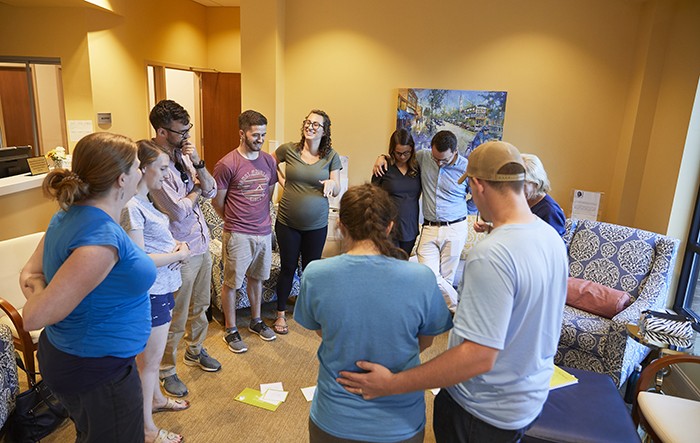
A CenteringPregnancy group led by Registered Nurse Denelle Kolkmann, meets at Reply Ob/Gyn & Fertility in November of 2019, prior to the pandemic. Classes are now being held via Zoom until gather-in-place restrictions are lifted.
“CenteringPregnancy is an amazing model that allows people to make connections and even lifelong connections,” she said.
CenteringPregnancy combines those regular prenatal checks with a group meeting for expectant moms. The visit begins with a weight and blood pressure check, and each woman then visits privately with her provider, asking any questions she may not want to ask in front of the group, says Sara Dowd, a certified nurse midwife with Triangle Physicians for Women, which has offices in Cary and Holly Springs.
From there, the women circle up to discuss pregnancy and postpartum experience. As a group, and sometimes with guest experts, they cover topics ranging from nutrition and stress management, to labor and delivery, Dowd says. Partners can join in as well.
“It’s not just a lecture,” she said. “What makes Centering work well is that we are getting people to engage in conversation. They get advice from people who are going through the same things, or have gone through the same thing in a previous pregnancy.”
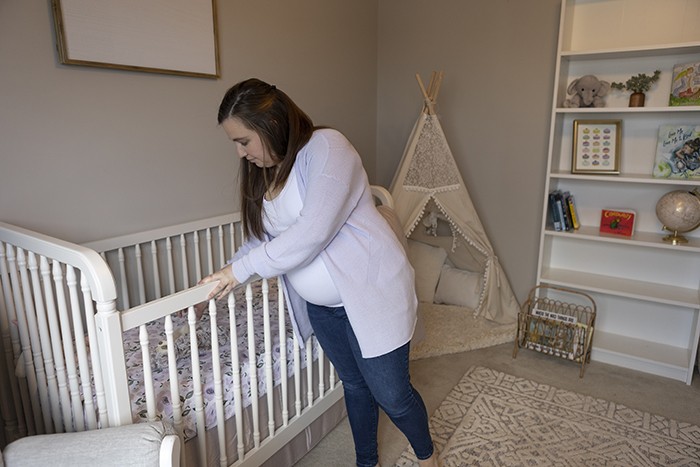
Jaden Miethe, a patient at Triangle Physicians for Women, has appreciated talking to other expectant moms over the last few months. “During the pandemic we have been meeting virtually for the Centering program and spend just a short amount of time at in-person clinic visits, typically only for ultrasounds and lab work. This has been helpful to still feel connected to other pregnant moms during a time when social distancing can be quite isolating,” she says.
Advantages of CenteringPregnancy
The program seems to have a number of advantages. Rachel Urrutia, a doctor with Reply Ob/Gyn & Fertility in Cary, which also offers CenteringPregnancy, says maternal mortality rates and severe complications from pregnancy are on the rise in the United States.
“We don’t know for sure what can fix the problem, but there’s a lot of thought that it’s about more than just the doctor and the hospital — that we may need a community approach,” she said.
Preliminary data on CenteringPregnancy shows women who participate tend to have better breast feeding rates and less postpartum depression, Urrutia says. It also shows African American women in particular have lower rates of low birth weight. While studies are still exploring exactly why CenteringPregnancy helps, it does seem to show a positive effect.
The experience treats prenatal care as a journey, rather than a clinical encounter, Urrutia says, and that has an impact on women’s mental health as well.
At the same time, it creates a sense of community for women that often continues after they give birth. In many groups, the women meet again around four to six weeks postpartum, so their babies can meet as well.

Moms from a Triangle Physicians for Women Centering group brought their babies, born late August- through October 2019, together for a reunion shortly after their births.
“I tell people, as someone who is a new mom pretty recently myself, that you do need support, and anyone that you can bring into your village is great,” Urrutia said.
Meg Berreth, a certified nurse midwife with UNC Midwives in Chapel Hill, says women in the Triangle may not have a lot of friends or family nearby to rely on during pregnancy, and CenteringPregnancy can fill that void.
“In this area, a lot of women are in transition — they are coming for school, or have just finished school, or maybe are in training,” she said. “Having this connection, knowing that you can text or call someone in your group with a baby so close to the same age, is really important.”
Sarah Gaby of Durham is one of those women. Gaby took part in CenteringPregnancy with her first child, who is about to turn 3, and now again, as she is pregnant with her second child.
She was at the end of a Ph.D. program at UNC-Chapel Hill when she became pregnant with her firstborn, and didn’t have a lot of friends with children locally.
“I was looking for opportunities to form connections around pregnancy and childbirth,” Gaby said.
Along with finding a community, she says she gained much from the discussions and educational speakers. Guests to her group included a prenatal yoga specialist, a pediatrician, and a pelvic floor physical therapist, among others. Her group could make suggestions if there were particular topics they were interested in covering.
Providers said they generally hear positive feedback to the CenteringPregnancy approach, and could think of few disadvantages, though several noted that if a woman is not comfortable speaking or sharing in front of a group, she may not enjoy the process. At every practice, women can try CenteringPregnancy early in their pregnancy and choose to go back to regular prenatal visits, if they feel it’s not the right fit.
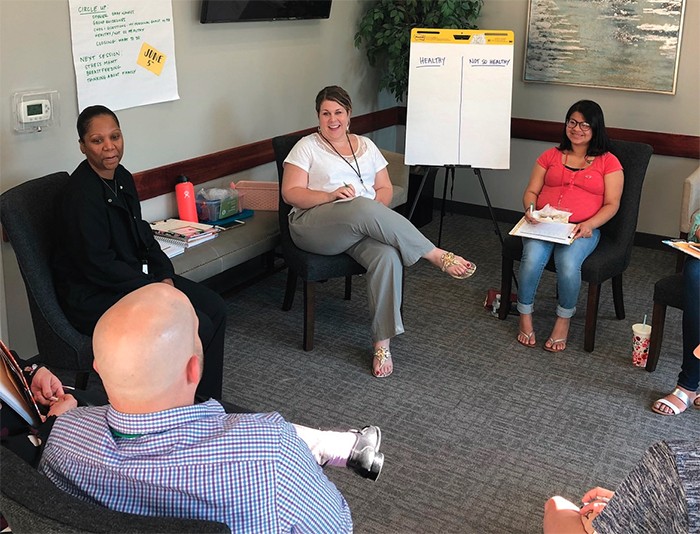
CenteringPregnancy group co-facilitators Valerie Ford, left, and Sara Dowd, center, meet with expectant parents at the Holly Springs Triangle Physicians for Women prior to the pandemic.
Changes Brought on by COVID-19
Pregnant with her second, Gaby’s CenteringPregnancy group has moved to Zoom, and she’s not alone.
UNC Midwives in Chapel Hill was able to pivot to a virtual format within a few months, while Reply Ob/Gyn and Triangle Physicians for Women both took a bit longer to make the transition. Each clinic reported cancelling meetings for several months in Spring 2020 when stay-at-home orders went into effect.
Now, provider visits take place in the clinic and CenteringPregnancy meetings happen separately in a virtual format.
Berreth says UNC Midwives is able to provide much of the same content in a virtual format and facilitate discussion. Although, it can take a little longer for the group to start opening up to each other.
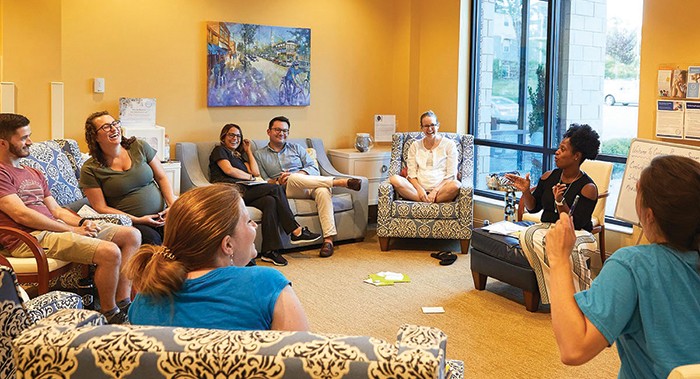
Beth Tyson, right, a certified nurse midwife, leads a CenteringPregnancy group at Reply Ob/Gyn & Fertility in November 2019. The practice now holds group meetings over Zoom, and individual doctor visits are in person.
“With in-person Centering, there’s time at the beginning and end for participants to chat, and time to ask the midwife or nurse a more private question,” Berreth said. “With the virtual format, the spontaneous breakout is just not there.”
Yet she says demand is there, and women may need it even more as they feel isolated during the pandemic — something Gaby agrees with.
“Being pregnant in a pandemic is kind of isolating, and people are really thankful to talk to each other,” she said. “I know for myself, I’m incredibly busy, but it’s a pleasure to make time for it.”
- Cary Celebrates 150 Years
- Nonprofit Spotlight: The Flower Shuttle
- Pregnancy is Better, Together
- Walk, Squat, Stand
- Dad Influencer Curtis Webster Jr.
- The Art of Perseverance
- Small Business Spotlight: A to Z Pharmacy
- Garden Adventurer: The Other Peppers
- Liquid Assets: Truth Serum Pale Ale from Tobacco Road Brewing
- Liquid Assets: The NC-21 (No Children Under 21), from The Provincial
- Restaurant Profile: Daybreak
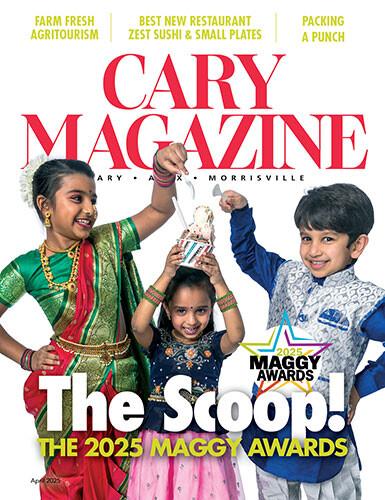


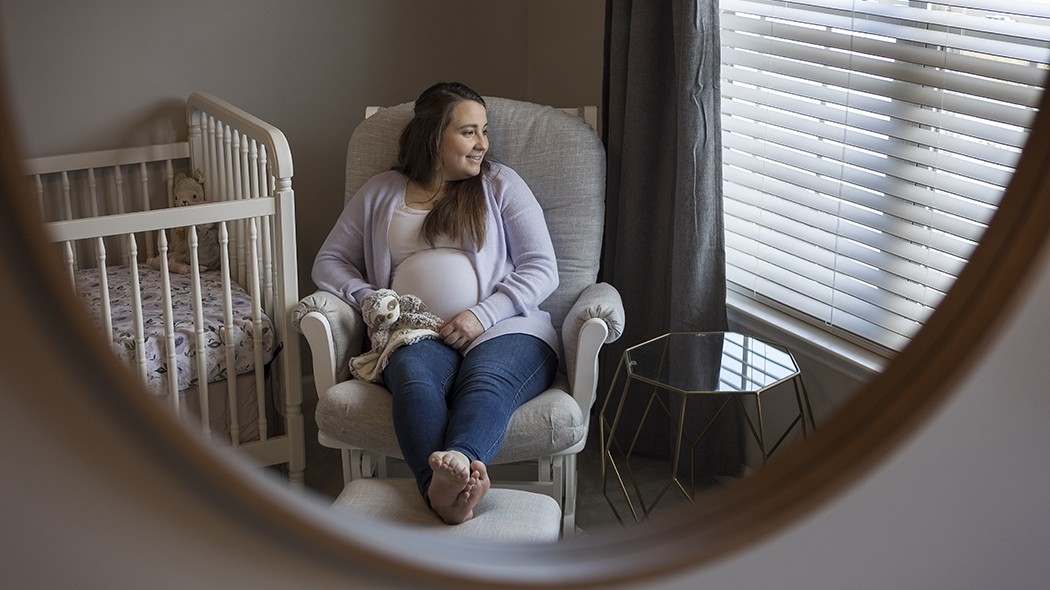



Thank you Lea for this amazing piece on Centering sites in NC and highlighting the amazing work they do to bring holistic relationship-centered care to women in their communities.
It’s interesting to learn about prenatal care and its different approaches. My younger sister is pregnant, and her ex-fiance left her at the altar a few weeks ago, so she’s going through a lot right now. I think she’d get support from other people who are going through the same things while getting healthcare services.